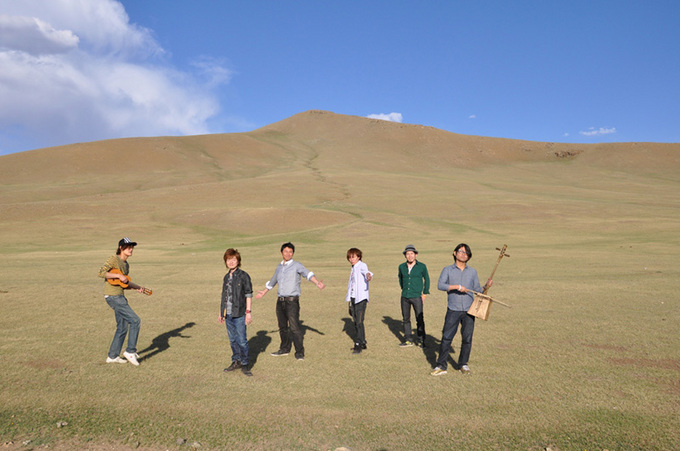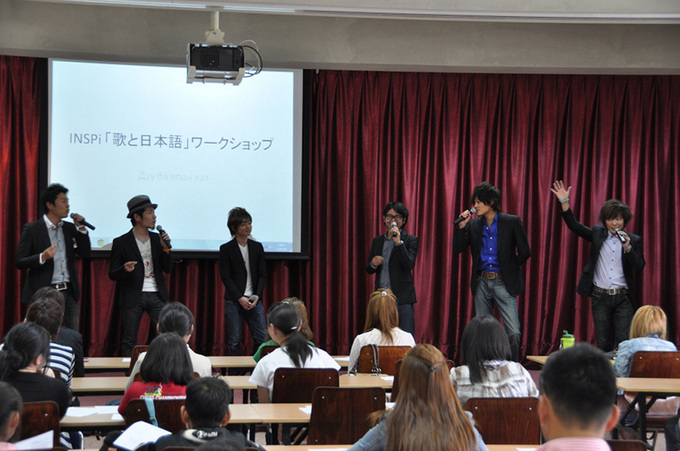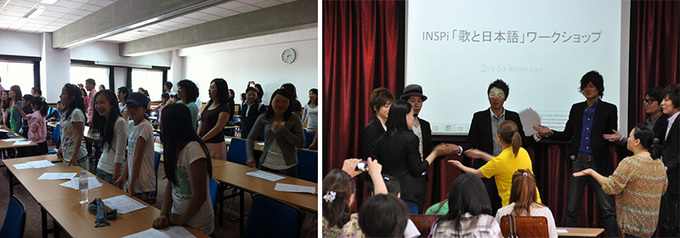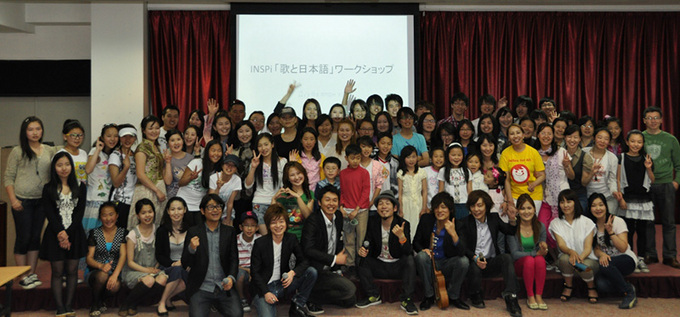Songs from a Japanese Heart: INSPi Concert in Mongolia
INSPi
In May 2012, when a chill lingers in the mornings and evenings of spring in Mongolia, a cappella group INSPi kicked off an event to celebrate the opening of a Japanese-language course offered by the Japan Foundation (JF Language Course*1). The first independent concert by a Japanese unit in Mongolia sought to develop in the audience a feeling of closeness to Japan by presenting the resonance and richness of the Japanese language through music. The event marked the opening of the JF Language Course in Ulan Bator, coinciding with the 40th anniversary of diplomatic relations between Japan and Mongolia.
"The first thing I felt upon landing at the airport was a sense of familiarity. The scenery that jumped into my eyes was full of Cyrillic characters--as exotic as I had expected--and yet somehow it all invoked a kind of nostalgia. Perhaps it had to do with the modest nature of the Mongolian people."
It was the first time for the INSPi members to visit Mongolia. They looked forward to the visit, and yet they were also anxious about the audience's reaction to their music. They landed in Ulan Bator, the capital city of Mongolia, with mixed feelings, that of a certain tension and that inspired by the message they hoped to convey as Japanese nationals and the qualities they aspired to communicate through their Japanese songs.
Japanese people have a natural sympathy for Mongolia, grounded in the images of professional sumo wrestlers, Genghis Khan, and the country's vast meadows. As it turned out, this sympathy was reciprocal: as many as 11,000 people across Mongolia study the Japanese language. In the wake of the Great East Japan Earthquake last year, they even delivered relief supplies, like blankets, sweaters, and portable shelters (traditional tents for nomads) called yurts, all in concern of the survivors who might have suffered from cold within few days after March 11.
 Mongolian-language lesson for INSPi members
Mongolian-language lesson for INSPi members
In the early stages of planning, INSPi members decided they want to sing not only in Japanese but also in the Mongolian language. Having learned of the interest of Mongolian people in Japan and the support they offered, they had developed a strong desire to convey their gratitude in their own voice, without an interpreter. At the concert, they fascinated the audience with their signature song "Kono ki nanno ki" (often called "Hitachi Tree", a Hitachi Group CM song) along with Mongolian-language versions of their original songs, member introductions, and even a part of their talks. They won cheers for a cappella renditions of Japanese pop songs, nursery rhymes, and enka ballads sung in Japanese, and at last earned a standing ovation from the capacity crowd of 500 audiences at the National Academic Drama Theatre.
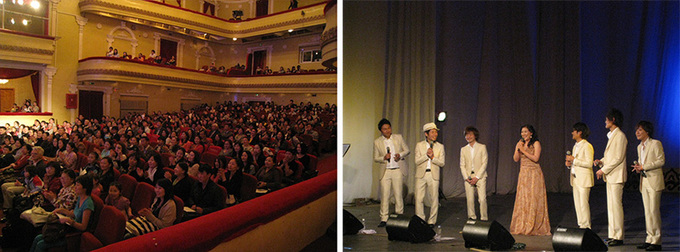 (Left) Audience; (Right) Performance with Mongolian singer Oyunaa
(Left) Audience; (Right) Performance with Mongolian singer Oyunaa
 (Left) Performance; (Right) Standing ovation at closing
(Left) Performance; (Right) Standing ovation at closing
"The minute the audience gave a cheer to the long-tone solo of 'Kitaguni no haru [spring in the North]', (which we added to the set list because of its popularity in Mongolia) I knew for sure that we were on the same wavelength. Differences in language, upbringing, or ways of thinking may create a gap between stage and audience--even in Japan. In Japan, stage and audience speak the same language. Sometimes I feel this gets in the way of our effort to deliver a message straight from the heart. The concert in Mongolia made me realize anew that we don't need to rely on words to get the message across."
INSPi members say they managed to get the message across without relying on words. But they gave their all to understand even a few words of the Mongolian language, and to express their thoughts in their own words despite their broken Mongolian. This all-out effort is the key that helps connect people from heart to heart.
The following day, the members held a workshop for students of the Japanese-language at the Mongolia-Japan Center for Human Resources Development. After warming up the crowd to the Japanese language with traditional children's game rhymes like "Anta gata doko sa" (aka Higo temari uta, [a hand ball tune]) and "Mikan no hana saku oka [Hill of Tangerine Blossoms]" (a postwar nursery song), they engaged the whole audience in a chorus of "Sakura sakura [Cherry Blossoms]". The participants, who were at first shy, gradually raised their voices in harmony. Here, too, INSPi members were convinced that the Mongolians love to sing, as the Japanese do, and they felt connected with the Mongolian people from heart to heart.
At the end of the workshop, one member addressed the participants. "The Mongolian language is difficult for us, and maybe the Japanese language is difficult for you. But we all harbor the same spirit. We don't need a great deal of words to express our feelings. Let's not worry that we don't speak each other's language well. Sometimes imperfect words carry a stronger message."
Everyone learning a foreign language has the same ideal: to be able to speak that language as fluently as a native speaker. But first we should think about why we study that language, as this often helps us identify the vocabulary we really need to learn. The Japan Foundation hopes that Japanese-language learners in Mongolia one day meet someone to whom they want to express their feelings in Japanese. That one day they discover an aspect of the Japanese culture about which they want to know in depth. And when the day comes, that they knock on the door of the JF Language Course.
 INSPi
A cappella chorus group belonging to Japanese talent agent Watanabe Entertainment. INSPi made its professional debut in December 2001 after appearing on the Fuji Television program Hamonep. The group has since collaborated with scores of musicians including Kazufumi Miyazawa of rock group "The Boom" and singer-songwriter Tsuyoshi Nagabuchi. Since February 2005, they perform "Kono ki nanno ki", (often called "Hitachi Tree", a Hitachi Group CM song). It has a wide range of repertoire from original numbers, pop, jazz, and folk, to ballad tunes, and has performed in overseas countries including Indonesia and Thailand.
http://www.inspi.cc/
INSPi
A cappella chorus group belonging to Japanese talent agent Watanabe Entertainment. INSPi made its professional debut in December 2001 after appearing on the Fuji Television program Hamonep. The group has since collaborated with scores of musicians including Kazufumi Miyazawa of rock group "The Boom" and singer-songwriter Tsuyoshi Nagabuchi. Since February 2005, they perform "Kono ki nanno ki", (often called "Hitachi Tree", a Hitachi Group CM song). It has a wide range of repertoire from original numbers, pop, jazz, and folk, to ballad tunes, and has performed in overseas countries including Indonesia and Thailand.
http://www.inspi.cc/
*1 Japanese-language course offered at 25 locations including the Japan Foundation overseas offices. The course focuses on building the ability to accomplish tasks in the Japanese language and competence in intercultural understanding, in compliance with the JF Standard for Japanese-Language Education.
Related Events
Back Issues
- 2023.12. 7 Movie Theaters aroun…
- 2023.6.16 The 49th Japan Found…
- 2023.4.24 The 49th Japan Found…
- 2022.12.27 Living Together with…
- 2022.12.27 Living Together with…
- 2022.8.12 Inner Diversity <…
- 2022.3.31 The 48th Japan Found…
- 2022.3.29 Beyond Disasters - T…
- 2021.11.29 Crossing Borders, En…
- 2021.4.13 Crossing Borders, En…


